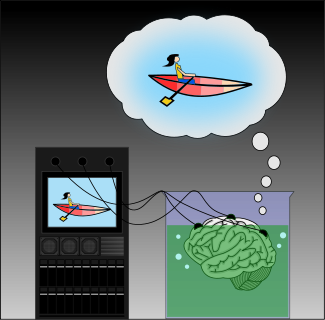Before attempting to answer the title question, we must first define what an "I" is. Now, the question of personal identity has troubled philosophers since time immemorial. The Buddhists believe the idea that we possess a self is an illusion. They call this doctrine Anatta. In the Western tradition, Derek Parfit is considered the foremost philosopher of personal identity. His book Reasons and Persons is no walk in the park. His thought experiments alone can make you dizzy! I'm not about to embark on a deep investigation of personal identity here, so let me take a different course. Let me begin by asking, not what "I" am, but what the Ego ("I" in Greek) is.
What is the Ego?
The ego is one clingy creature, that's for sure! Like a vine, it twists itself around whatever happens to lie in its vicinity. If it happens to find itself in a person of talent, it clings to his talents. If it happens to find itself in a beautiful but stupid person, it makes beauty its food, and it grows to arrogant proportions. It can feed off anything, it can grow anywhere. It can subsist on any kind of matter. And it makes no distinctions—every climate is equally good, every soil suits its taste equally well. Like a weed, it has managed to inhabit every continent and make every human mind its home. There is no intellect, no matter how base, that lacks it. Like a fungus, it can grow both on feces and filet mignon. Quality is not a factor. And though this creature is omnivorous, which is to say something akin to polygamous, every lover thinks he alone enjoys its supposedly exclusive affections.
Are you getting what I'm saying? I view the Ego as a singular, not as a plural. It's not many things. It's just one thing, that takes on the shape of whatever container it happens to find itself in.

All these identical water-egos identify themselves with different flask-bodies. And they are very proud of them!
A cuckoo's Ego
A bird can't see his offspring's genes. So how does he know its his offspring? "Well, if it's in my nest, and has roughly the expected shape, then it's my child!" That'll work.
Most of the time!

Source: Wikipedia Commons
Reed warbler raising the young of a common cuckoo.
Don't think though the illusion can only go one way! It's not just parents that get their offspring mixed up, children also can get confused about their parentage, in a process called imprinting.

Baby geese following their mom.
"Of course he's my mom. He's the first thing I saw when I hatched," a baby goose stated in an interview.
The imprinting Ego
The Ego is similarly blind when it comes to the real self. Heck, as my introduction implies, we don't even know what the real self is! At least genes can tell us who our real relatives are. But who can tell us what, or who, we really are? The Ego, therefore, much like the birds, takes a shortcut:
A man spends more time with himself than with anyone or anything else. He therefore learns to care more about himself than about anyone or anything else. What we call "ego" is really just man’s tendency to assign more value to whatever it is that fills his time and space, whatever occupies the majority of his experience and memory. A man who believed that his body was a paperboard box would care about this box as passionately as men commonly care about their own bodies. A man whose body is hidden from view since his birth and who is only allowed to watch a television soap opera will care more about the fate of the fictional characters in it than about "himself," since his whole experience and memory is filled with the images and actions of these fictional characters, whereas his own body does not feature in his life. What people call their "self" is whatever features most prominently in their life. Since it happens to be the case that we can see our own bodies, and since we spend more time with our own bodies and feelings than with anyone else's, we tend to care more about these things we spend our time with, i.e. ourselves.
Ego-imprinting gone awry
It is perfectly possible for a man to cease caring about his own body (what other people will call his "self") because, for instance, he has learned to identify himself with a virtual body: for all I know, I could be a brain in a vat!

Source: Wikipedia Commons
"Of course that's my body: my thoughts and its actions coincide perfectly!" said Brain in an interview.
Are you getting where I'm going with this? Here's a hint: The brain above doesn't really own the body. Or does it? Who's to say.
Well I think it's time we answered the title question of this post.
Can a man own a woman?
Sorry about rephrasing the title question like that, but I needed one more tag to make 5, so I thought, "why not feminism?"
So consider this scenario.
Say your hands and legs suddenly get a mind of their own, and start acting all crazy—giving people the middle finger, grabbing pussies, kicking butts, behaving in all kinds of unsavory ways—you will understandably be a little bit upset. So you scold them. Next thing you know, they've packed their bags and moved to their parents', leaving you dismembered.

That ^ That right there, creeps me out.
So you call them, demand they come back. "You don't own me!" they say. "Yeah I do!" you say in a fit of paroxysm. "You're a misoleggist!" says the leg. "Bodyarchy is alive and kicking!" says the hand.
Well you get my drift. Chauvinism. Misogyny. Patriarchy. Blah blah. Thing is: it's just psychology. The only reason I think I own my body, is because it's always been with me. I think my thoughts are my own because I'm there when they're being thought. So what happens when two people share a significant portion of their time with each other, for years? What happens when a person knows another person's body better than its owner does? What happens when half the thoughts being thought are verbally articulated to the other person, with whom everything is shared? The Ego, remember, does not have access to our 'genes'. All it knows is: whenever I open my eyes, this thing is there. Therefore, this thing is part of me, belongs to me. Far from a foolproof logic, but, like the birds and the geese, it's all the Ego has to go on.
I could go on about the concept of ownership. I could prematurely introduce my theory of investment. I could use legal metaphors and talk about how being in a relationship is like a person allowing you to use his back as a canvas, on which you draw your masterpiece, and then that person just up and leaves, taking your masterpiece with him, and you call them a thief, and demand restitution. (Sorry, I had a bad experience recently with someone stealing my art. "It's garbage!" they said. "No, it's an objet trouvé, you philistine!" I replied. They don't seem to care: every night at 2 a.m. they arrive in their noisy art collector truck and steal all my art.) I won't do all this, cos I want to wrap this up, and because the point I believe has been made: I have explained how the Ego identifies with whatever happens to be around it, whether that thing really belongs to it or not (whatever that means). If you want the answer in one sentence, here it is: "Can a person own another person's body?" "Not anymore, or any less, than he can own his own body." "Can two people share ownership of the same body?" "Yes, if both have spent a significant amount of time with it."
When I introduce my theory of investment, I will argue that we own whatever we have invested in the most. If romantic suicides are any indication, it would appear that some people will rather forfeit their own life and body, than relinquish that of another. Romantic ideation, hero worship, people thinking they're Jesus, or Napoleon, or Michael Jackson—all these are ways in which the Ego has began to identify itself more with a "foreign" body, because its thoughts are more occupied with that body than with its own. Remember: the Ego gets its identity by wrapping itself around anything that's near it. But it has no necessary connection to anything: it might as well be wrapping itself around empty air.

That's some deep shit.
Made with Quozio.
Source: The Meaning of Life, p. 150.
This completes the 9th installment of the Meaning Of Life series. In case you missed the other episodes:
Part 8: Against Subjectivism - Is Everything Relative?
Part 7: The Value-Laden View of Life
Part 6: I Am Therefore I Harm
Part 5: Nietzsche vs Christianity: Are Christians Nihilists?
Part 4: Can we desire death?
Part 3: Are nihilists being honest when they say life has no value?
Part 2: Does death make life meaningless?
Part 1: Is it possible to be a nihilist?
I'll see you in the next episode, working title: "Moms and Egos"!

Come join us on Discord! https://discord.gg/7qyarFD
